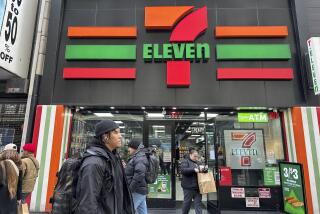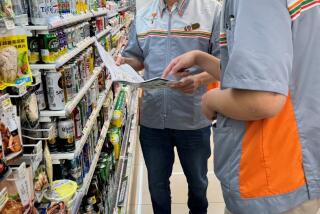7-Eleven Owner to Buy Millennium, Become Japan’s Biggest Retailer
- Share via
TOKYO — Seven & I Holdings Co., owner of 7-Eleven convenience stores in Japan and the United States, said Monday that it would buy department store operator Millennium Retailing Inc. in a cash-and-stock deal that would create Japan’s largest retailer.
Tokyo-based Seven & I aims to jump-start its growth with department stores that have been benefiting from improvement in Japan’s economy, though the outlook for general merchandise and convenience stores remains gloomy because of market saturation.
The company’s move comes as foreign rivals attempt to gain further footholds in Japan’s already crowded retail sector.
Competition in the industry intensified this month when Wal-Mart Stores Inc., the world’s largest retailer, took a controlling stake in Seiyu Ltd., Japan’s fourth-largest supermarket chain.
“As we value what each one of us have, we want to create a new [retailing] model through our merger,” Seven & I Chairman and Chief Executive Toshifumi Suzuki said at a news conference.
Suzuki said he had high hopes for Millennium President Shigeaki Wada’s skill in differentiating his company from other department stores, a talent that Suzuki said was needed to win in a saturated retail market. Wada would become Seven & I’s vice president in May.
Aside from 7-Eleven, Seven & I also owns the Ito-Yokado supermarket chain. Millennium owns Japanese retailers Sogo Co. and Seibu Department Stores Ltd.
Their combined revenue would be about $38.8 billion for the year ended Feb. 28, making Seven & I the largest retailer in Japan, followed by Aeon Co.
Seven-Eleven Japan became a shareholder in Dallas-based 7-Eleven Inc. in 1991 and finished buying all the shares in November.
The move was designed to make 7-Eleven more competitive by boosting investment in merchandising, store renovation and distribution.
Seven & I said it planned to first buy a 65% stake in Millennium held by Nomura Principal Finance for $1.13 billion in cash by the end of March.
The company then would buy the remaining 35% directly from Millennium in a stock swap by June. Millennium is an unlisted company.
After the announcement, Standard & Poor’s Ratings Services placed its ratings on Seven & I’s subsidiaries on credit watch with negative implications, citing debt at Millennium, which was formed in 2003 after Seibu combined with failed Sogo.
“The acquisition cost and Millennium Retailing’s debt burden are likely to put financial stress on the Seven & I Holdings group, causing deterioration in its capital structure, while less-profitable department stores will become a larger part of its business composition,” analyst Machiko Amano said in a report.
“As a result, Seven & I Holdings group companies may not be able to maintain the financial profile and profitability consistent with current ratings,” she said.
Data on Monday indicated that Japanese department store sales rose 3.2% nationwide in November, a third consecutive month-on-month gain. Supermarket store sales fell 0.4% for a 21st straight month of decline.
More to Read
Inside the business of entertainment
The Wide Shot brings you news, analysis and insights on everything from streaming wars to production — and what it all means for the future.
You may occasionally receive promotional content from the Los Angeles Times.










